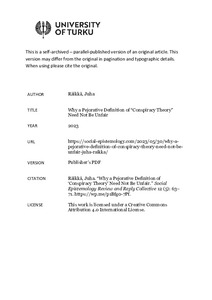Why a Pejorative Definition of “Conspiracy Theory” Need Not Be Unfair
Räikkä Juha
https://urn.fi/URN:NBN:fi-fe2023060151038
Tiivistelmä
Because of the pejorative connotation of the concept of “conspiracy theory”, many philosophers have proposed that the concept should be redefined. Their worry is that if conspiracy theories are considered implausible by definition, then the theories cannot get fair treatment and will be rejected for just being conspiracy theories. In this paper, I argue that this worry is unfounded. Accepting a pejorative definition of the term “conspiracy theory” allows for individual conspiracy theories to be investigated properly and in accordance with good research practices. However, not all conspiracy theories deserve further investigations. For example, it would be irrational, unethical, and unrewarding to study the alleged conspiracy of space lizards.
Kokoelmat
- Rinnakkaistallenteet [27094]
